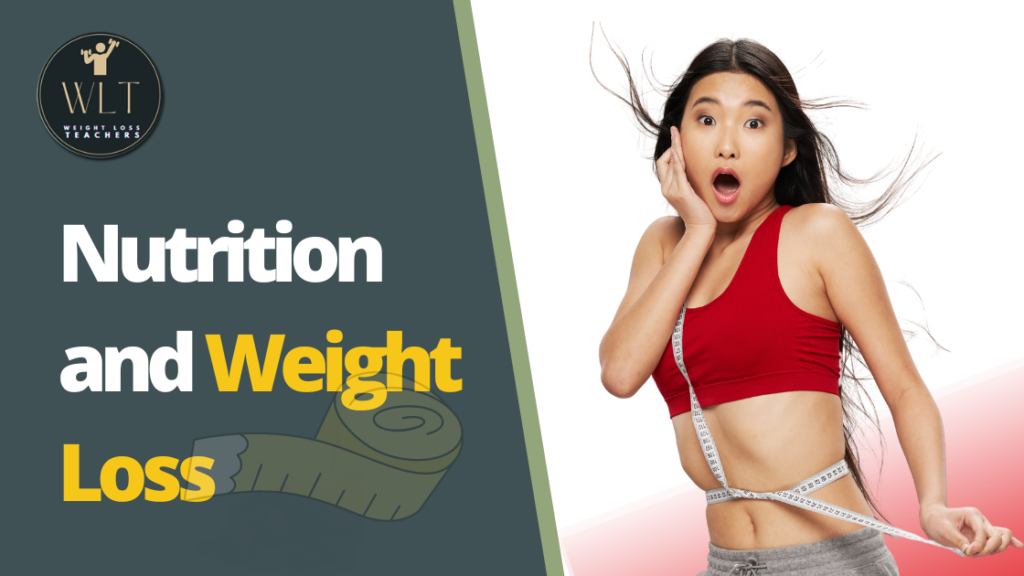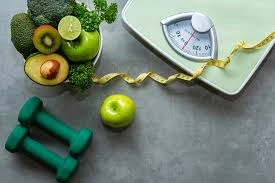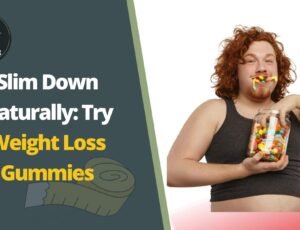
Nutrition and Weight Loss

People greatly respect their health, so technology has become a primary tool for weight loss. Wearable fitness trackers could be your closest friend whether you’re just starting or now live healthier.
Table of Contents
Introduction
Nutrition plays a crucial role in weight loss. The food we eat not only provides energy but also helps in maintaining a healthy body weight. Proper nutrition and a well-balanced diet can go a long way in helping people achieve their weight loss goals. However, with so much information available on the internet, it can be confusing to determine what to eat and what to avoid. In this article, we will discuss the fundamentals of nutrition and weight loss and provide practical tips on how to achieve your weight loss goals through healthy eating habits.

What is Nutrition?

Nutrition refers to the process of consuming and utilizing nutrients from the food we eat to maintain our body’s health and functions. Nutrients are the building blocks of our body, and they help in the growth, repair, and maintenance of tissues and organs. The six essential nutrients that our body requires include carbohydrates, proteins, fats, vitamins, minerals, and water.
Carbohydrates are the primary source of energy for our body. They are found in foods like bread, rice, pasta, and fruits. Proteins are required for the growth and repair of tissues and organs. They are found in foods like meat, fish, eggs, and dairy products. Fats are essential for energy production and the absorption of certain vitamins. They are found in foods like butter, oils, nuts, and seeds. Vitamins and minerals are required for the proper functioning of the body’s processes. They are found in fruits, vegetables, and whole grains. Water is necessary for various functions of the body, including digestion, absorption, and transportation of nutrients.
How Does Nutrition Affect Weight Loss?

Weight loss is a multifaceted journey that revolves around the fundamental principle of creating a calorie deficit – expending more calories than you consume. However, the intricacies of this process go far beyond mere calorie counting. The quality of the calories you consume plays an equally crucial role in determining the success of your weight loss efforts. It’s not just about reducing calories; it’s about reducing the right calories. Understanding how nutrition impacts weight loss is essential for anyone striving to shed those extra pounds and achieve a healthier, more sustainable lifestyle.
One of the most common misconceptions about weight loss is the idea that simply cutting calories will guarantee success. While calorie reduction is undeniably a critical component, the source of those calories matters greatly. Consuming foods that are high in empty calories, such as processed foods, sugary snacks, and saturated fats, can derail your weight loss goals. These empty-calorie culprits may indeed result in an initial decrease in caloric intake, but they often come laden with detrimental consequences for your overall health and weight management.
The key to achieving successful and sustainable weight loss lies in your food choices. Nutrient-dense foods should be the cornerstone of your dietary strategy. These foods offer a double benefit: they provide your body with essential nutrients while keeping your overall calorie intake in check. Nutrient-dense foods are typically rich in vitamins, minerals, fiber, and protein, making them invaluable allies on your weight loss journey.
Fruits and vegetables are prime examples of nutrient-dense foods. They are packed with vitamins and minerals that support bodily functions, as well as fiber, which aids in digestion and provides a feeling of fullness, helping to curb overeating. Whole grains, like quinoa, brown rice, and oats, are another important category. They are not only a source of complex carbohydrates but also provide essential nutrients and dietary fiber. Lean proteins, such as chicken breast, turkey, tofu, and legumes, offer the dual advantage of satisfying hunger and promoting muscle preservation during weight loss. Finally, healthy fats, like those found in avocados, nuts, and olive oil, are essential for overall health and can even aid in appetite control.
Incorporating nutrient-dense foods into your diet is not only about shedding pounds but also about improving your overall health. These foods can enhance your immune system, promote better digestion, and reduce the risk of chronic diseases such as heart disease, diabetes, and certain cancers. By focusing on these nutritional powerhouses, you not only create the foundation for a successful weight loss journey but also pave the way for a healthier, more vibrant life.
Furthermore, proper nutrition extends beyond food choices; it encompasses meal timing, portion control, and dietary balance. Eating at regular intervals throughout the day can help maintain stable blood sugar levels and prevent overeating during later meals. Portion control ensures that you consume appropriate amounts of nutrient-dense foods without excessive calorie intake. Finally, achieving a balanced diet that includes a variety of nutrient-dense foods ensures that your body receives all the essential nutrients it needs for optimal functioning.
Note: There might be affiliate links mentioned here. We may receive a commission if you purchase a product through an affiliate link. There is no additional charge for you. Please do your own research before making any online purchases.
Practical Tips for Nutrition and Weight Loss

Plan Your Meals
Planning your meals in advance is a strategic step toward achieving your nutrition and weight loss goals. By taking the time to create a meal plan and grocery list, you set yourself up for success. This approach not only helps you make healthier food choices but also minimizes the chances of impulsive, less nutritious options. When you have a plan, you’ll purchase only the items you need, reducing food waste and saving money.
Additionally, meal prepping can be a game-changer. Spending some time on the weekend preparing meals or portioning out ingredients for the week ahead can save valuable time during busy weekdays. It also acts as a safety net, preventing you from resorting to fast food or takeout when you’re pressed for time. A well-thought-out meal plan keeps you on track, making it easier to stick to your weight loss goals.
Focus on Whole Foods
Whole foods are nutritional powerhouses that can significantly contribute to your weight loss journey. These foods are either unprocessed or minimally processed, encompassing fruits, vegetables, whole grains, lean proteins, and healthy fats. They’re packed with essential nutrients, including vitamins, minerals, fiber, and protein, all while being relatively low in calories.
When you prioritize whole foods, you’ll discover that they have the unique ability to keep you feeling full for longer periods. This satiety factor is crucial in reducing the temptation to overeat or snack on unhealthy options. By making whole foods the foundation of your diet, you ensure a steady supply of nutrients that support your overall health while aiding in your weight loss efforts.
Avoid Sugary and Processed Foods
To maintain a healthy weight, it’s crucial to steer clear of sugary and processed foods. These items are loaded with empty calories, devoid of essential nutrients, and can swiftly lead to weight gain. Moreover, consuming sugary and processed foods can wreak havoc on your blood sugar levels, triggering cravings and encouraging overindulgence.
Instead, opt for natural sweeteners like honey or maple syrup, and replace processed snacks with whole, unprocessed alternatives. This shift toward more natural and nourishing choices can help stabilize your energy levels and reduce the temptation to indulge in empty-calorie treats.
Portion Control
Even nutrient-dense foods can contribute to weight gain if portion sizes are unchecked. Portion control is a fundamental aspect of successful weight management. Simple strategies like using smaller plates or bowls, measuring serving sizes, and avoiding distractions while eating (such as watching TV or using a computer) can help you stay mindful of your food intake.
Being mindful of portion sizes ensures that you consume a reasonable amount of calories, even when eating nutrient-rich foods. It prevents unintentional overeating and keeps you aligned with your weight loss goals.
Stay Hydrated
Water is an often underestimated ally in the pursuit of weight loss. Staying adequately hydrated not only keeps your body functioning optimally but also aids in flushing out toxins. Moreover, drinking water can help reduce feelings of hunger and promote a sense of fullness, ultimately decreasing the likelihood of overeating.
Aim to drink at least eight glasses of water a day. By opting for water over sugary beverages like soda or energy drinks, you not only save on empty calories but also support your body’s natural processes, making your weight loss journey more effective and sustainable.
Incorporate Physical Activity
Physical activity is an indispensable component of any weight loss regimen. It not only burns calories but also assists in building lean muscle mass, which, in turn, revs up your metabolism. Engage in an activity that you genuinely enjoy, whether it’s running, swimming, cycling, or any other form of exercise, and aim for at least 30 minutes a day.
Regular physical activity not only aids in shedding pounds but also has a multitude of other health benefits. It boosts your mood, improves cardiovascular health, and enhances overall well-being.
Seek Professional Help
If you find yourself struggling to reach your weight loss goals or facing medical conditions that hinder your progress, it may be beneficial to seek professional assistance. Registered dietitians and certified personal trainers are valuable resources. They can provide personalized guidance, tailor dietary and exercise plans to your unique needs, and offer ongoing support on your weight loss journey. Their expertise can help you overcome obstacles and achieve the sustainable results you desire. Remember, it’s okay to ask for help when striving for better health and wellness.
Common Mistakes to Avoid in Nutrition and Weight Loss

Cutting Out Entire Food Groups
One of the most common mistakes in nutrition and weight loss is the drastic elimination of entire food groups from one’s diet, such as carbohydrates or fats. While it’s true that certain diets advocate for such exclusions, this approach can lead to a host of issues. Most notably, it can result in nutrient deficiencies and an unbalanced diet, as each food group provides unique essential nutrients that our bodies need.
For instance, carbohydrates are a primary source of energy and supply vital nutrients like fiber, vitamins, and minerals. Similarly, fats, when chosen wisely, offer essential fatty acids that support various bodily functions. By eliminating these food groups, you risk depriving your body of essential nutrients, which can lead to health problems in the long term.
A more effective approach is to focus on consuming nutrient-dense foods from a variety of food groups. Balance is key. Instead of cutting out carbohydrates or fats completely, choose healthier options within those categories. Opt for whole grains over refined carbohydrates, and select unsaturated fats, such as those found in avocados and nuts, over saturated fats. This balanced approach ensures that your body receives the necessary nutrients without compromising your weight loss goals.
Over-Reliance on Supplements
Another common mistake people make in their pursuit of better nutrition and weight loss is relying too heavily on supplements. While supplements can be beneficial in filling nutrient gaps, they should never be seen as a replacement for a healthy diet. Whole foods offer a complex interplay of nutrients, fiber, and other bioactive compounds that supplements cannot fully replicate.
Overusing supplements can also have unintended consequences. Excessive intake of certain vitamins and minerals can lead to toxicity, potentially causing health issues. Moreover, the financial cost of purchasing numerous supplements can add up quickly, making it an unsustainable approach.
It’s always best to get your nutrients from whole foods. These foods provide a spectrum of nutrients that work synergistically to support your health. A well-balanced diet should be the foundation of your nutrition plan, with supplements used sparingly and under the guidance of a healthcare professional when there are specific deficiencies or health concerns.
Relying on Fad Diets
One of the most pervasive and detrimental mistakes in the realm of nutrition and weight loss is relying on fad diets. These diets often promise rapid weight loss through extreme and unsustainable eating patterns. While they may deliver short-term results, they are rarely effective in the long run.
Fad diets can be harmful because they often eliminate entire food groups, severely restrict calorie intake, or encourage the consumption of only specific foods. Such practices can lead to nutrient deficiencies, muscle loss, and metabolic imbalances. Furthermore, they are typically unsustainable, making it likely that individuals will revert to their old eating habits once the diet ends, resulting in weight regain.
A healthier and more sustainable approach to weight loss and improved nutrition involves making small, gradual changes to your diet and lifestyle. Focus on building habits that can be maintained over the long term. Incorporate a variety of nutrient-dense foods, practice portion control, and engage in regular physical activity. Sustainable weight loss is about creating a balanced and enjoyable relationship with food, rather than resorting to extreme measures that ultimately do more harm than good. By making lasting changes to your eating habits, you can achieve and maintain your desired weight while supporting your overall health and well-being.
FAQs (Frequently Asked Questions)
Q1. What is the role of nutrition in weight loss?
A1. Nutrition plays a pivotal role in weight loss as it involves consuming the right balance of nutrients to create a calorie deficit. This deficit occurs when you burn more calories than you consume, leading to weight loss.
Q2. What are the essential nutrients our body needs for proper functioning?
A2. The six essential nutrients our body requires are carbohydrates, proteins, fats, vitamins, minerals, and water. Each plays a unique role in maintaining overall health and supporting various bodily functions.
Q3. How do carbohydrates affect weight loss?
A3. Carbohydrates are the primary source of energy for our body. Choosing complex carbohydrates from whole foods like grains, fruits, and vegetables can help sustain energy levels and prevent overeating.
Q4. Can fats be a part of a weight loss diet?
A4. Yes, fats are essential for energy production and the absorption of certain vitamins. Opt for healthy fats like those found in avocados and nuts, as they can also aid in appetite control.
Q5. How does water intake impact weight loss?
A5. Water is crucial for weight loss as it keeps the body hydrated, flushes out toxins, and reduces hunger. Drinking enough water can help prevent overeating and support your weight loss efforts.
Q6. What is the significance of meal planning in weight loss?
A6. Meal planning helps you make healthier food choices, avoid impulsive decisions, and reduce food waste. It also saves time and minimizes reliance on fast food or takeout.
Q7. Why are whole foods important in a weight loss diet?
A7. Whole foods are nutrient-dense and provide essential vitamins, minerals, fiber, and protein while being relatively low in calories. They promote a sense of fullness and help curb overeating.
Q8. How do sugary and processed foods affect weight loss?
A8. Sugary and processed foods are high in empty calories and can lead to weight gain. They also disrupt blood sugar levels, leading to cravings and overeating.
Q9. Why is portion control important for weight management?
A9. Portion control ensures you consume an appropriate amount of calories, even with nutrient-dense foods. It prevents unintentional overeating and helps maintain a calorie deficit.
Q10. When should one seek professional help for weight loss?
A10. Consider seeking professional guidance if you struggle to meet your weight loss goals or have underlying medical conditions hindering your progress. Registered dietitians and certified personal trainers can provide tailored advice and support for sustainable weight loss.
Conclusion
Nutrition plays a crucial role in weight loss. By consuming nutrient-dense foods, controlling portions, staying hydrated, and incorporating physical activity, you can achieve your weight loss goals in a healthy and sustainable way. It is essential to avoid common mistakes like cutting out entire food groups, over-reliance on supplements, and relying on fad diets. By making small, sustainable changes to your diet and lifestyle, you can achieve long-term weight loss success and improve your overall health and well-being.
Disclaimer: The information provided in this article is for educational purposes only and should not be considered as a substitute for medical advice. Consult a healthcare professional before implementing any home remedies or making significant changes to your lifestyle.






